From my Own Ghetto into a Space of Solidarity
By Louie Ybañez
Louie Ybañez, a licensed architect by profession, is a seminarian of the Missionary Society of St Columban and is currently studying theology at Ateneo de Manila. He is from Agusan, Cagayan de Oro City, Mindanao, Philippines. He spent two years on First Mission Assignment in Pakistan from 2014 to 2016. Here are two articles he wrote, the first after returning to the Philippines and the second while still in Pakistan.
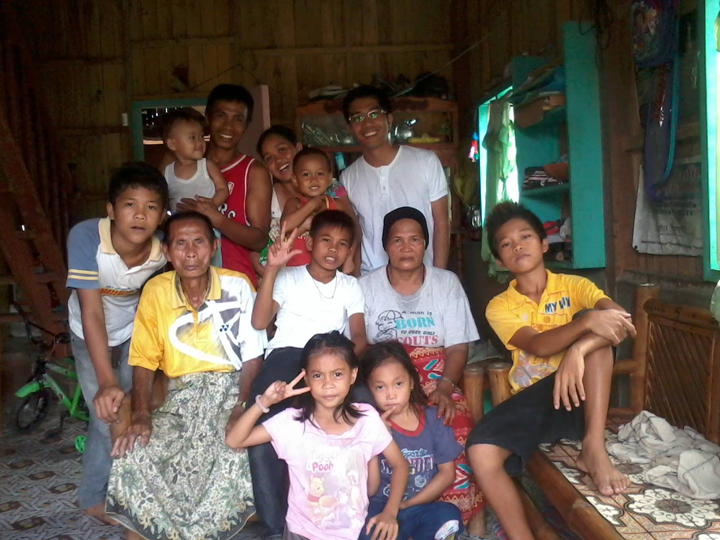
Louie (back row far right) with Asnawi Family, Sultan Naga Dimaporo, Lanao del Norte
When I lived in Pakistan I was part of the 1.6 percent who are Christians in this predominantly Muslim country of an estimated 203 million people. In Pakistan many Muslims have hardly even met a Christian and certainly do not know anything about the Christian faith. Nor are most of them even interested because it is not a major concern for nor does the Christian faith impinge on their daily lives. Prejudice among Muslims towards Christians and vice versa, is common because of the lack of willingness or even interest to engage with each other.
People in the Philippines, where I grew up, are inclined to have this same attitude. The predominant religion in is Catholicism. Common perceptions of Muslims are based on preconceived notions handed down from one generation to the next. Most of these preconceptions are quite offensive and express false notions about the culture and religion of Muslims.
When I was young I used to see Muslims selling in the market-place. I did not interact with them. I just listened to the offensive comments usually used to describe them. At the same time, I also learned early on in school that they pray five times a day. I could not reconcile these two opposing views of Muslims then.
Before leaving for Pakistan, I was fortunate enough to get to know some Meranao Muslims here in Mindanao. Most Christians only know them as ‘Muslims’ but don’t bother to learn their language or take an interest in their unique culture. I, however, was fortunate enough to be able to live for a while with Asnawi Mangka and his family and parents in Sultan Naga Dimaporo, Lanao del Norte, my first experience living with Muslims. I remember my apprehensions at first. I grew up with the usual Christian perceptions of them as being aggressive, hostile and not to be trusted.
These preconceptions were very far from what I experienced when I finally got to live with them. I joined them in planting crops on their farm, exploring their place, and I was able to join them when they prayed in the mosque. I ate with them and during meals Asnawi asked that we take turns to pray before meals out of respect for each other’s religion. It was a powerful gesture from Asnawi to allow me to pray with them in my own Christian way. I felt I was in a space of freedom and I was accepted for what I was. I also admired Asnawi’s family and neighbours for their hospitality and their willingness to befriend a complete stranger like me. It was not easy at first, but our willingness to engage with each other and my ability to ask questions helped me to overcome some of the long-held prejudices I had. It was very liberating for me.
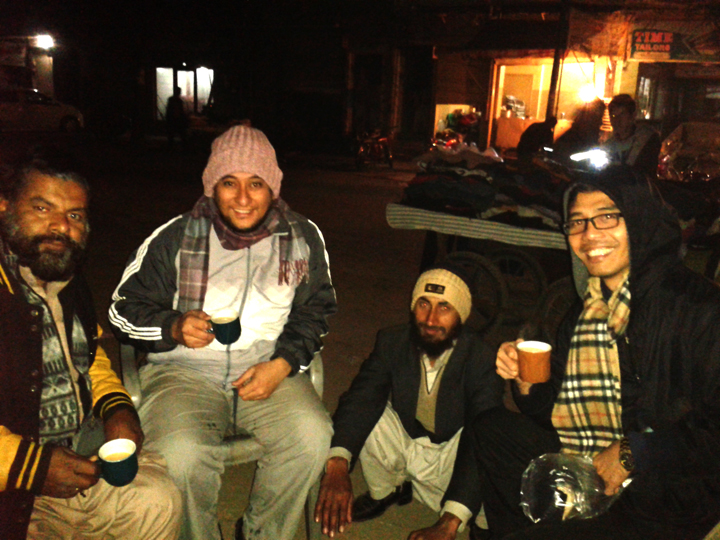
Louie (far right) drinking tea with friends in Pakistan
The same attitude and openness allowed me to overcome my anxieties when I was in Pakistan. I started exploring the alley-ways in the place where I was assigned. I talked to strangers and gave myself time to familiarise myself with the people by joining them for meals during special occasions, or just spending time in long conversations over a cup of tea. Some became like brothers to me. Although I was constantly bombarded by accounts of negative experiences of Muslims with Christians, my prior memories of the time spent with Asnawi and his family enabled me to realize that one’s religion should not be confused with one’s individual behaviour and cultural practices - which is what tends to happen in Pakistan. It was hard to go against the ghetto mentality that exists among the Christian minority in Pakistan. However, I drew inspiration from the Meranao Muslims that I lived with in Mindanao. Asnawi and his family not only opened their home; they opened their lives and hearts with the warmth of their welcome.
Now I’m back in the Philippines. That experience with Asnawi and his family has contributed to my being able to somehow understand how it is to live as part of a minority in a country where the majority confuse culture with religion. Recently I joined an event called ‘Duyog Ramadan’ where Christians join Muslims in the daily breaking of the Ramadan fast (Iftar). It was very encouraging to see many Christians joining this event in a symbolic gesture of solidarity. Among those who joined were students.
It is very important that we value a celebration that matters to our Muslim neighbors no matter how small a minority they are in the overall population of the Philippines. I am hopeful that by constant openness to engage with people from other faiths, the current indifference and mistrust will diminish and that we will begin to see more objectively that, though we are different, in our innermost being we are very similar. Whether one belongs to the minority or the majority does not matter. What is most needed is our constant openness to engage with people from other faiths, to find the good in them and to appreciate our differences rather than to let them divide us. I am optimistic as I continue on a journey to move farther outside my own ghetto, to a space of freedom from prejudice, because I see a great need for this at a time where sectarian violence is so common and where the tendency to condemn others out of ignorance is so pervasive.
Pakistan National Catholic Youth Camp 2007 Ayubya

Dialogue of Ordinary Life in Pakistan
This article, written when Louie was still in Pakistan, first appeared on the July 2016 issue of The Far East, the magazine of the Columbans in Australia and New Zealand.
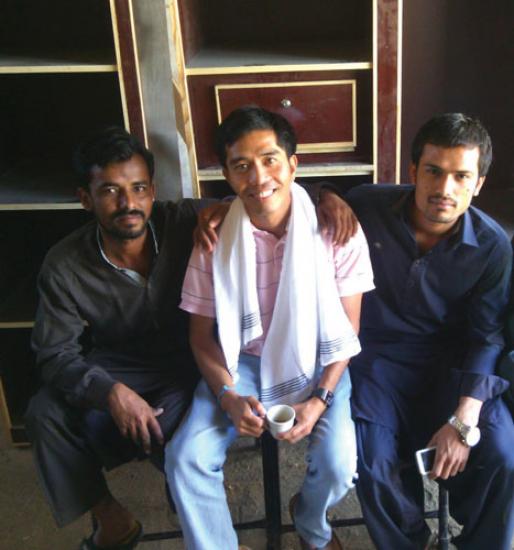
Louie with friends in Pakistan
I am assigned to St Joseph’s Parish, in Matli, the Diocese of Hyderabad, Pakistan. The parish has a Christian community that lives close to Hindu and Muslim neighbors. This is a great start for my interest in interreligious dialogue.
One finds many prejudices among the different religious communities. It seems that sensitive issues are often brushed under the rug for fear of an outburst of violence. If buttons are pushed, so to speak, it could lead to an outburst such as what happened in Lahore in 2014 when two churches were bombed. Two men suspected of involvement were beaten and burned to death by an angry mob.
Because of this, we look for opportunities that present themselves in ordinary daily life to share and witness to our faith. Here are two examples.
Saleem and his sons
I got to know Saleem and his sons, Imran and Amir, through Columban Fr Tomás King who is Irish. Many times they have been commissioned to do some carpentry work for the parish church. During my free time, I go to their carpentry shop. We talk mostly about carpentry. I share my thoughts as well. The two sons are very friendly. Through them I have become aware of the traditions and culture of Pakistani Muslims. I also tell them about the Philippines and our culture and traditions. They introduced me to many of their friends. This has helped me grow in confidence in getting to know many Muslims and relating to them.
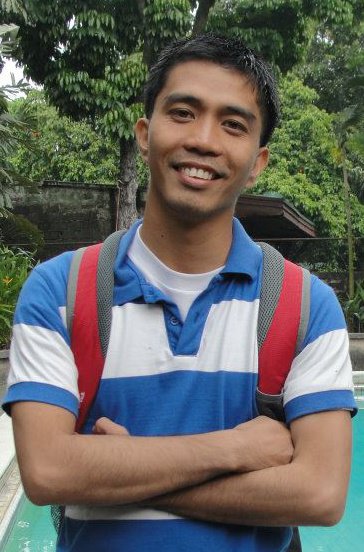
The author
The man on top of the bus
Once when I travelled to Badin from Matli, the bus broke down so I had to transfer to another bus. As it was peak hour I had no choice but to climb up on the roof of the bus and sit along with many people on their way home from work. I sat comfortably in the center of the roof with a good scenic view of the Sindh plains. Many of my fellow roof passengers were surprised and interested as to why a seemingly ‘Chinese man’ would climb up the roof for half-fare. Anyone from other parts of Asia is usually assumed to be from China.
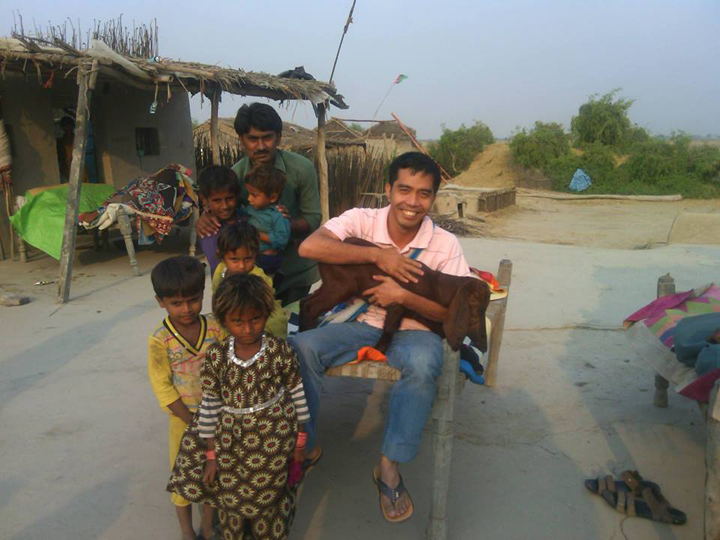
Louie with friends in Pakistan
Soon enough I got into a conversation and my little knowledge of the Urdu language became very handy. What caught my attention was this young man who wanted to talk to me but was unable because he sat too far away. He noticed the cross on the rosary bracelet that I was wearing. Unable to be heard he pointed to the cross and then he pointed towards the sky. When we reached Badin I asked him if he was a Christian. He was a Muslim. I was stunned by a Muslim associating the cross with God. We introduced ourselves and parted ways with a handshake.
Here in Pakistan dialogue happens in the everyday reality of life. It happens as I walk down a busy alley, as I respond to the greetings of my Muslim and Hindu neighbors, as I go through different stores and am offered chai (Pakistani tea) as a sign of hospitality. In the school I get to witness friendship between children of different religions. It comes about when I go to a barbershop and engage in casual conversation when being asked all sorts of questions or when I travel on a bus where I get to stand beside a complete stranger and engage in conversation on the harsh but sometimes funny realities of Pakistani life.
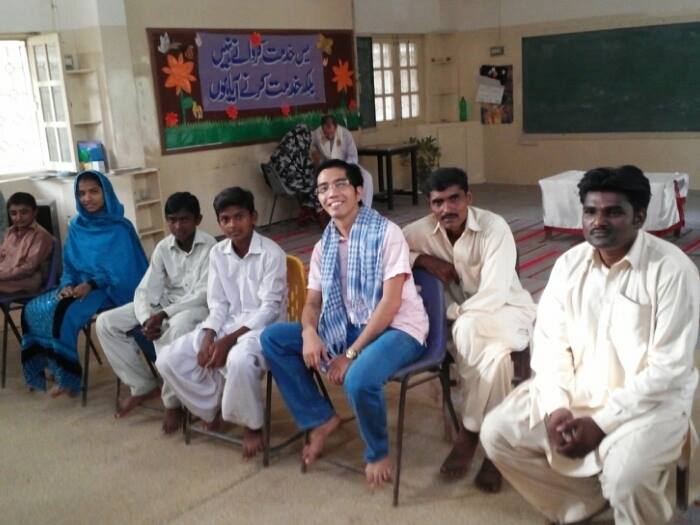
With more friends in Pakistan
